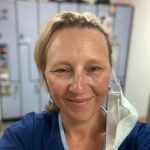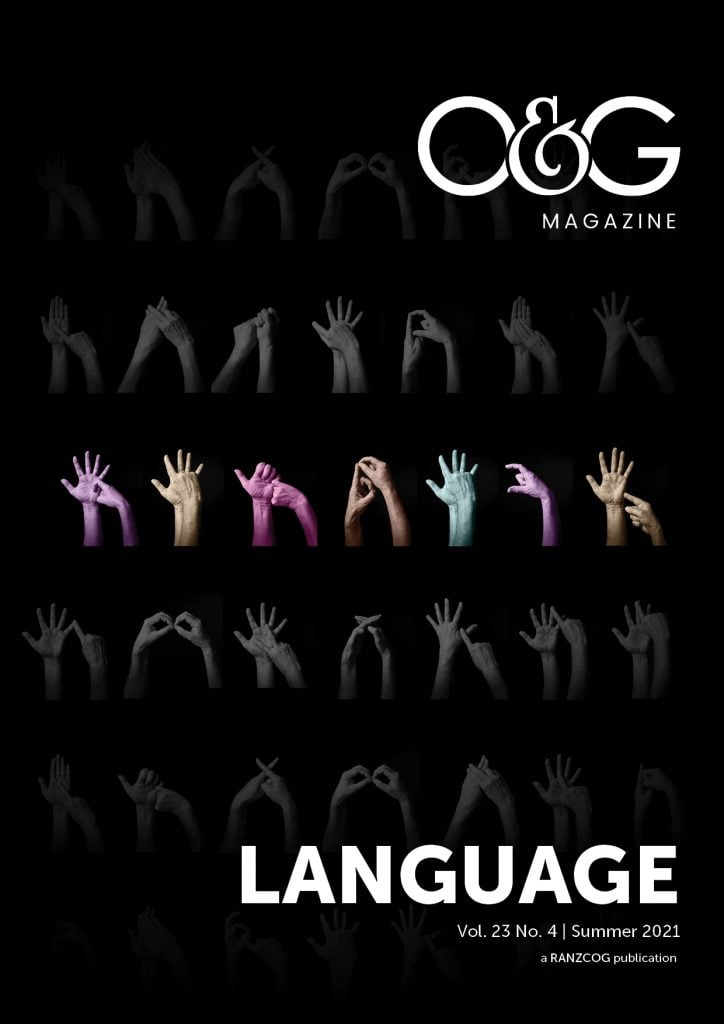MD: One of my earliest introductions to the importance of words was a recommendation from an ornery old white male orthopaedic surgeon when I was a medical student. We must have been arguing about something and he recommended I read Dale Spender’s Man Made Language. This Australian text was published in 1980 and describes how male writers shape patriarchal societies with language, and I think it is glorious that he told me (a cis white chick) to read it.
AW: Similar to Marilla, my interest in the dynamic nature and power of language was sparked as a student – in my case, as a teenager in high school. I was in year 12 and my school had introduced a new subject called ‘English Language’ into the school curriculum. I had never particularly enjoyed my English classes and the idea of analysing period texts in Literature didn’t sound particularly enthralling, so I jumped at the opportunity to be a guinea pig student for this new subject. I fell in love with the subject, consuming every book I could find on the topic. I read Prof Kate Burridge’s Blooming English from cover to cover, and I must admit when I heard that Dr John Schibeci had successfully commissioned a piece by Prof Burridge for inclusion in this issue, I had a bit of a fan-girl moment. I came to learn that the way my friends and I spoke, with all our ‘likes’ and ‘you knows’, was described by linguists as ‘teen speak’, and disappointingly that English had over 2000 expressions to refer to women in a sexually derogatory way.
However, the double-edged nature of language to both include and exclude, and empower and disempower people, had hit home several years earlier when my mum had been diagnosed with breast cancer. My mum was shocked by her cancer diagnosis and by the surgery required for treatment – a mastectomy. My mum’s reaction was not helped by her doctor’s description of the surgery, ‘You’ll be cut from here to here… don’t think you’ll be wearing a top like that anymore,’ nor his lack of empathy at her reserved response, ‘I don’t know what you’re worried about, it’s just a useless gland.’ A useless gland. These words rang in my mum’s mind for months and years to come, causing more hurt than this doctor may have imagined. In medicine, the words we use when speaking to patients can make an enormous difference to their care experience and indeed their health outcomes. It is critical that we communicate with empathy and respect. Moreover, the words we use in the written form, such as in medical records and consent forms, are equally important, as I was reminded recently when seeing a patient for an abortion. Beyond being medical and legal documents, medical records and consent forms are a reflection of a patient’s story and it is important that they are a true representation of their context and situation.
MD: More recently, my interest in language has been noting in my year 7’s diary/planner. There is an inspirational quote for each week, and only five of 30 quotes were by women (feedback was provided)! Next was the gift of a lockdown book from a book club friend – Cassandra Speaks: When Women are the storytellers, the Human Story Changes by Elizabeth Lesser. I am now keeping a list of great quotes I come across, particularly to replace the war metaphors with those of kitchens and creating. Begone ‘the scientists battling COVID in the lab’ (there will be winners and losers), bring on ‘working like beavers’ (persistent, tenacious) or ‘politicians recommending bleach is a recipe for disaster’.
AW: Like Marilla, my interest and passion for language continues to grow, along with my list of problematic words, phrases and grammar! Babies are ‘born’ not ‘delivered’1 [MD: pretty sure women were delivered from their biblical-style suffering…], people are not inherently ‘vulnerable’ but oppressive structures and systematic exclusion may give rise to vulnerability,2 and ‘ATSI’ is never an acceptable acronym and is incredibly offensive to many Aboriginal and Torres Strait Islander People.3 Over the last few years, I have worked in global maternal newborn health research and programs, predominantly with Pacific Island countries. There continues to be language used in global health and development that has strong colonial roots, reflecting historical and ongoing power imbalances. For example, the term ‘capacity building’ is often heralded as a project goal and is generally used to describe a ‘one way’ arrangement where a team from a high-income country builds the knowledge and skills (capacity) of a local team in a low- or middle-income country. This language fails to recognise that the knowledge and skills of the non-local team are also ‘being built’ and undermines the expertise of the local team. It may be more respectful and representative to describe a reciprocal strengthening of capacity taking place through a process of co-learning. As I have demonstrated, global health tends to group and categorise countries, such as, ‘low-, middle- or high-income’, ‘developing or developed’ or ‘Global North and South’.4 These definitions are far from ideal and serve to reinforce the global dominance of the West. Narrowly defining countries based on their wealth and development acts to further marginalise, minimise and disregard the volumes of knowledge, expertise and experience within Indigenous communities. Whether working in global health or caring for patients in Australia and New Zealand, it is critical that we are aware of, and reflect upon, the language we use to avoid perpetuating colonial legacies associated with domination and subordination.
MD/AW: Respectful and inclusive language is vital for good healthcare, and the most appropriate language to use is, as always, an ongoing conversation. Language is a dynamic, organic part of human life, and we should expect and welcome language change as new perspectives emerge, and most importantly the voices of those who may be the subject of particular words and descriptions are listened to and heard. And as for whether this is a load of political correctness? As the sociologist DaShanne Stokes says, ‘Political correctness’ as ‘over-sensitivity’ is code for saying the privileged shouldn’t have their unearned privileges questioned.’5
In bringing about this special issue of O&G Magazine, we want to take this opportunity to thank all the wonderful contributors who, through their writing, challenge us to reflect and reconsider the words we write, speak and think. It is important to note that there is so much more discussion to be had around language, especially from the perspectives of First Nations scholars, academics and orators – stay tuned for a language edition round 2. We would also like to acknowledge Lisa Westhaven, a previous O&G Magazine team member, who had the initial idea for this issue. Enjoy the collection of must-read books and articles provided by magazine contributors and readers that follow – a summer reading list perhaps?
We hope this issue generates discussion, and as people of science who seek the truth, we continue to rediscuss and reassess how best we use our language to provide safe and respectful healthcare and a society that works for all.
Further reading
Books
- All About Yves by Yves Rees
- Cassandra Speaks: When Women Are the Storytellers, the Human Story Changes by Elizabeth Lesser
- Forbidden Words by Keith Allan and Kate Burridge
- Man Made Language by Dale Spender
- Pain and Prejudice by Gabrielle Jackson
- The Dictionary of Lost Words by Pip Williams
- Unwell Women: A Journey through Medicine and Myth in a Man-Made World by Elinor Cleghorn
Articles
- A pouch of Douglas by any other name by Jane McCredie
- Always bet on black (power) by Chelsea Watego
- Don’t call me mister – call me doctor by Samantha Pillay
- Elderly aunt goes viral with wonderful poem about gender-neutral pronouns
- Humanising birth: Does the language we use matter? by Natalie Mobbs, Catherine Williams, Andrew D Weeks
- Ravaldi C, Vannacci A, Homer C. Respectful language in intrapartum and newborn care. Lancet Global Health. 2021;9(1)
- Roberts Z, Carlson B, O’Sullivan S, et al. A guide to writing and speaking about Indigenous People in Australia. 2021. Macquarie University. doi.org/10.25949/5TFK-5113
- ‘Sorry’ is not a word you want to hear when you’re pregnant by Sam Drummond
- The power of words revisited by Nicky Leap (Leap N. The power of words. Nurs Times. 199226;88(21):60-1. PMID: 1608762.)
- Twitter thread on misgendering by Sandy O’Sullivan
- War Metaphors in Political Communication on Covid-19 by Eunice Castro Seixas
- The National Collaborating Centre for Determinants of Health: Let’s talk: populations and the power of language (Canada, 2013)
References
- Hunter LP. Women give birth and pizzas are delivered: language and western childbirth paradigms. Journal of Midwifery & Women’s Health. 2006;51(2):119-24.
- Munari SC, Wilson AN, Blow NJ, et al. Rethinking the use of ‘vulnerable’. Australian and New Zealand Journal of Public Health. 2021;45(3):197-9.
- Canuto K, Finlay SM. I am not here for your convenience. Australian and New Zealand Journal of Public Health. 2021;45(4):305-6.
- Nnodim Opara I. It’s time to Decolonize the Decolonization Movement. PLOS Blogs. 2021. Available from: speakingofmedicine.plos.org/2021/07/29/its-time-to-decolonize-the-decolonization-movement.
- Stokes D. www.dashannestokes.com







Leave a Reply